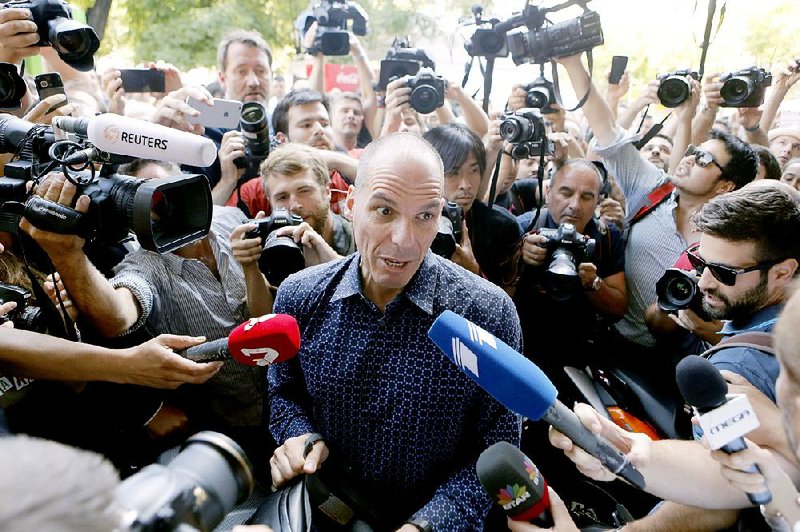ATHENS, Greece -- Germany maintained a hard line with Athens on Monday after Greek voters rejected Europe's austerity policies in a referendum, intensifying pressure on Prime Minister Alexis Tsipras to restart bailout talks and opening a rift with European countries that appeared more inclined now to consider softening the push for austerity.
"Time is of the essence," German Chancellor Angela Merkel said after discussing the Greek crisis with French President Francois Hollande in Paris. "[Greek] proposals have to be on the table this week."
As Tsipras changed his finance minister Monday and laid plans to restart bailout negotiations with creditors, however, it appeared the jubilation that followed the vote of no in Greece could fade quickly as signs of financial collapse become more evident.
While the referendum -- which resulted in 61 percent of voters rejecting creditors' bailout proposal -- bought some time to return to negotiations, Greek banks are almost out of cash and are expected to stay closed for at least several more days, analysts and people close to the situation in Greece said.
The government decided Monday that a bank holiday scheduled to end today would now be extended through Wednesday, and a daily cap on ATM withdrawals of less than $70 in place since last week, could be tightened. Long lines formed again at cash machines Monday in Athens as people continued to take out money in dribs and drabs.
German Deputy Chancellor Sigmar Gabriel said in Berlin that European leaders needed to prepare humanitarian aid of food and medicine for Greece.
"The situation that is now being created by the referendum makes me sad because life for the Greek population is going to get harder in the coming days and weeks," he said. "After yesterday's celebrations in the streets, there's a danger of a rude awakening soon."
He further warned that any new bailout would likely be harsher than the terms of the previous one, a vow that is unlikely to go down well in Athens.
It is clear that "the outcome of the referendum is a rejection of the rules of the economic and monetary union," Gabriel said. "We cannot simply pretend that nothing has happened."
Germany, the eurozone country to which Greece owes the most money and the one that has taken the hardest line in the debt talks, said Monday that while Greece was still in the eurozone, it was up to Athens to determine whether the country would stay.
The Greek government said Monday afternoon that Tsipras and Merkel had spoken by telephone and had agreed that he would present new debt proposals today, when finance ministers from the 19 eurozone members are to meet in Brussels.
In Paris, Merkel and Hollande both expressed their respect for the result of the Greek vote but urged swift action from Athens.
"I stress that there is not lots of time left. There is urgency for Greece. There is urgency for Europe," Hollande said.
Meanwhile on Monday, the European Central Bank decided not to expand emergency loans to Greek banks, keeping them about $98.4 billion, which keeps banks from failing but will not prevent them from running out of cash they can issue to depositors within a few days.
The central bank also said it would tighten requirements for collateral that Greek banks must post in return for loans. The decision means that, even if the central bank decides to increase the lending limit, Greek banks might not have enough collateral needed to qualify for more emergency cash.
The decision was a concession to hard-liners on the central bank's Governing Council, and a sign the central bank is worried about losses it would suffer if Greek banks fail.
The central bank left unspecified the timing of the extension of its $98.4 billion credit line, but it increased the pressure on Greek banks by raising the amount of collateral required to receive the emergency assistance.
A senior Greek banking official said after the announcement that Greek banks had been provided with enough money to last until Wednesday evening. The European Central Bank plans to revisit its decision on Wednesday after a critical Tuesday summit of euro-zone leaders, the official said.
"It's putting pressure on all sides," the official said. "We go day by day until a resolution is found."
Greece owes billions of euros to its creditors on July 20.
Global markets have seesawed over the past weeks as the Greek showdown unfolded. On Monday, the euro lost ground, and Asian and European exchanges were down, but there were no signs of a panicked sell-off. Wall Street also was down.
Greeks reshuffle
At Tsipras' behest, Yanis Varoufakis abruptly resigned Monday as finance minister and was replaced by Euclid Tsakalotos, an Oxford-educated economist who took over from Varoufakis as Greece's lead negotiator at the end of April.
Tsakalotos, 55, has appeared more willing to engage with creditors and will be tested as soon as today, at a meeting of the other 18 eurozone finance ministers in Brussels.
"I won't hide from you that I am very nervous and very anxious. I am not taking over at the easiest moment in Greek history," Tsakalotos said after being sworn in.
After a six-hour meeting, the leaders of Greece's five main political parties issued a statement saying they would seek discussions with creditors to secure sufficient funds for the nation's financing needs. They also pledged to carry out "credible reforms," tackle unemployment and broach the issue of making Greece's large public debt more sustainable.
Varoufakis, who announced his resignation via a tweet, said in a statement on his website that he was stepping down because Greece's creditors had made it clear that they did not want to negotiate any further with him.
"Soon after the announcement of the referendum results, I was made aware of a certain preference by some Eurogroup participants, and assorted 'partners,' for my 'absence' from its meetings; an idea that the prime minister judged to be potentially helpful to him in reaching an agreement," he said. "For this reason, I am leaving the Ministry of Finance today."
Varoufakis called for the prompt conclusion of "an agreement that involves debt restructuring, less austerity, redistribution in favor of the needy and real reforms."
He included in his announcement a parting comment of his interlocutors in the debt negotiations, saying, "I shall wear the creditors' loathing with pride."
An academic with no political experience before he joined the leftist Tsipras government, Varoufakis had consistently argued that Greece desperately needed debt relief more than anything else.
While many economists shared that view, he quickly became a lightning rod among Greece's creditors for his aggressive negotiating style and heated language. Before the referendum vote, he had publicly accused the creditors of "terrorism" against his country.
France's finance minister, Michel Sapin, in an interview Monday with French radio, criticized Varoufakis for the "terrorism" accusation against creditors.
"That was wrong," he said, speaking after Varoufakis announced his resignation. "This was a spirited man, who has faith. But he also made statements that were difficult to accept, especially in France, including using the term 'terrorism.'"
But Sapin indicated that the French government would draw a distinction between any resentment of Varoufakis' negotiating tactics and the problems still facing Greece.
Sapin said that while Greece's no vote "resolves nothing," France could support debt relief for Greece should Tsipras come forward with a proposal containing "serious" terms for a new bailout package.
If Greece now comes back to the negotiating table with a solid plan to jump-start talks, France could be prepared to "ensure that in the early days, the early years, Greece's debt is alleviated," Sapin said.
A Greek exit from the eurozone "is not desired by the French president," Sapin said. Nonetheless, he added, if Greece were to leave the euro, the currency bloc would not be destabilized.
Seeking a solution
Other European leaders seemed eager to avoid the specter of a Greek exit from the euro, as images of Greeks celebrating their repudiation of austerity were broadcast worldwide.
Officials in France and in Brussels said Monday that they were unhappy and dumbfounded with the no vote, but let it be known that they would hold the door open to the possibility of a compromise between Greece and its creditors.
At a news conference in Brussels, the European Commission's vice president for euro affairs, Valdis Dombrovskis, said that the no vote in Greece would "dramatically weaken" the country's negotiating stand with creditors and had made things "more complicated."
But now is the time to seek a way forward, he said, adding, "If all sides are working seriously, it's possible to find a solution, even in this very complicated situation."
Spanish Prime Minister Mariano Rajoy said Greece needs to enact reforms that will spur economic growth and comply with obligations to pay off its debt to remain part of the eurozone.
"We're inclined to help Greece, but Greece must follow Europe's rules," he said in an interview on Spain's Telecinco evening news program.
In Washington, White House spokesman Josh Earnest urged European leaders to seek a framework that allows Greece to remain in the euro zone, but noted that "significant differences" stand in the way.
Information for this article was contributed by Liz Alderman, Jack Ewing and Niki Kitsantonis of The New York Times; by Griff Witte, Michael Birnbaum, Ylan Q. Mui and Brian Murphy of The Washington Post; and by Derek Gatopoulos, Angela Charlton, Demetris Nellas, Menelaos Hadjicostis, David Rising, Lori Hinnant, Raf Casert and Geir Moulson of The Associated Press.
A Section on 07/07/2015

